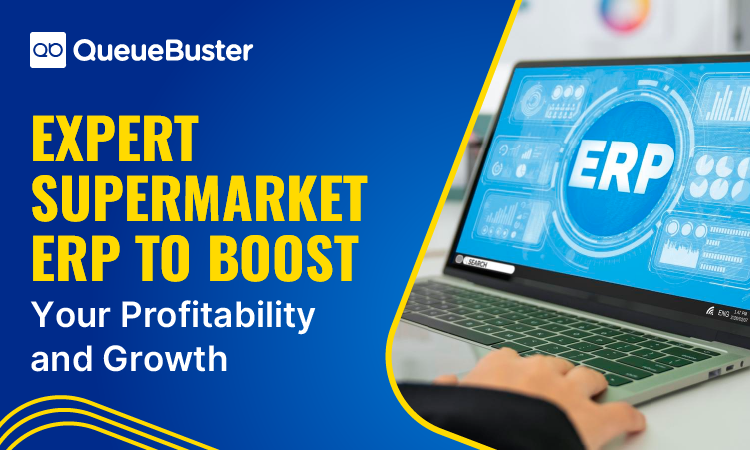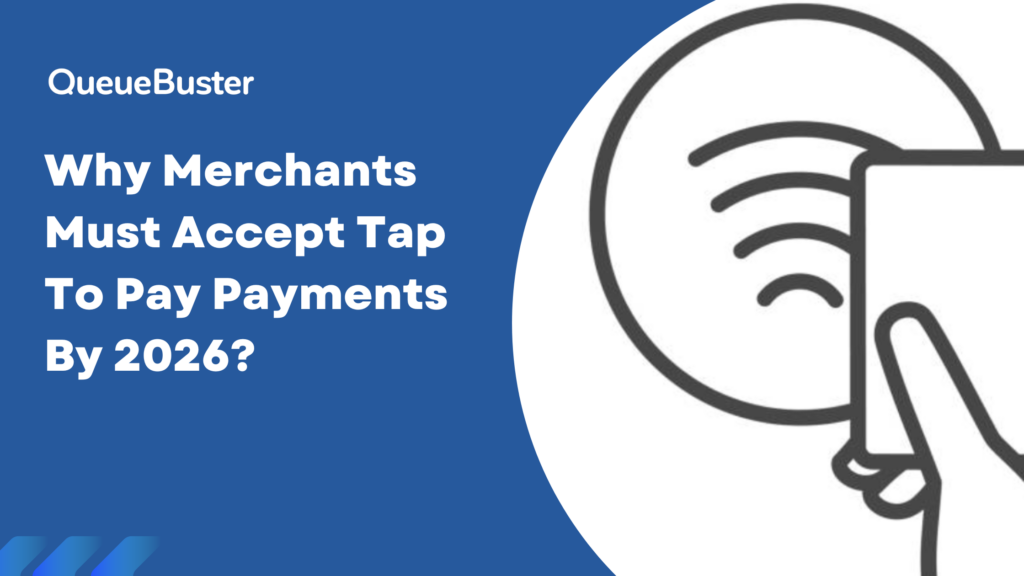
Expert Supermarket ERP to Boost Your Profitability and Growth
Expert Supermarket ERP to Boost Your Profitability and Growth

By QueueBuster Team Published: March 11th, 2023
If you’re running a supermarket, you know that managing inventory, finances, and customer relationships is a challenging task. However, in today’s fast-paced business environment, it’s crucial to stay competitive and profitable.
This is where an Enterprise Resource Planning (ERP) system can help. A supermarket ERP software is a software solution that integrates various business processes into a single system, providing real-time information and streamlined workflows.
In this context, supermarket POS software brings numerous benefits, from inventory management to improved customer service, boosting profitability and growth. We’ll discuss the main advantages of implementing an ERP system in your supermarket.
Enhanced Inventory Management
ERP software for supermarkets provides real-time inventory management. The software lets supermarkets track inventory levels, optimize stock, and reduce costs linked with stocking too much or too less. According to a study by VDC Research, retailers using automated inventory management systems can achieve an inventory accuracy rate of 95% or higher, compared to just 63% for those using manual methods. If you are seeking a complete solution, do schedule a call with our experts from QueueBuster, who are leaders in the supermarket POS software category.
Improved customer experience
These systems collect customer data and provide insights into customer preferences and buying habits. This allows supermarkets to tailor promotions, product offerings, and services to individual customers, leading to a more personalized experience and increased loyalty. A survey by Accenture found that 75% of consumers are more likely to buy from a retailer that recognizes them by name, recommends products based on their past purchases, or knows their purchase history.
Automating routine tasks
A supermarket billing system can automate routine tasks such as ordering, invoicing, and payment processing. This frees up staff time, reduces errors, and improves the overall efficiency of supermarket operations. This, in turn, leads to cost savings and improved profitability. A study by Forrester Research found that retailers using automation tools for operational tasks can reduce labor costs by up to 20%.
Cost reduction will surprise you
Along with other functions, Supermarket ERP software systems also identify areas to reduce cost, such as through better inventory management or more efficient use of labor. This can help supermarkets reduce overhead costs and improve profitability. A report by Aberdeen Group found that businesses using ERP systems can reduce operating costs by an average of 23% and administrative costs by 22%.
Better decision-making
Supermarket POS software systems provide real-time data and analytics, which can help managers make better-informed decisions. This leads to more effective pricing strategies, better supply chain management, and improved overall performance. According to a study by Nucleus Research, businesses using ERP systems report a 19.2% increase in process efficiency and a 20.3% reduction in operational costs. These figures would be corroborated by experts from QueueBuster when you interact with them.
Improved supply chain management
With ERP software for supermarkets, companies can better manage their supply chain, from procurement to distribution. This leads to improved forecasting, supplier management, and coordination with logistics partners. According to a survey by Supply Chain Insights, businesses using ERP systems report a 19% reduction in inventory levels and a 20% improvement in on-time delivery rates.
Enhanced data security
A supermarket billing software provides robust data security features to protect sensitive customer and business data, reducing the risk of breaches and data loss. This is one of the biggest concerns of customers when they share their mobile numbers or swipe their cards.
Better employee productivity
By automating routine tasks and streamlining operations, a supermarket billing system improves employee productivity, allowing them to focus on more important tasks such as customer service. A study by Deloitte found that businesses using ERP systems report a 26% increase in productivity and a 20% reduction in employee training time.
Accurate financial reporting
ERP systems provide accurate financial reporting, making it easier for supermarkets to track revenue, expenses, and profitability. This helps identify areas where costs can be reduced or revenue can be increased. According to a study by Panorama Consulting Solutions, businesses using ERP systems report a 68% improvement in financial reporting accuracy.
Sharp customizable reporting
ERP systems can generate customized reports that provide insights into key performance indicators, allowing supermarkets to make data-driven decisions and optimize their operations. According to a study by Aberdeen Group, businesses using ERP systems report a 35% reduction in time spent generating reports and a 23% improvement in data accuracy.
Accurate sales forecasting
Supermarket billing software can provide accurate forecasting based on historical data. This allows supermarkets to better plan for demand and adjust inventory levels accordingly. This can reduce waste and improve profitability. According to a report by McKinsey, businesses that use predictive analytics to improve demand forecasting can increase their sales by up to 10%.
Better Vendor Management
An ERP system provides supermarkets with real-time information about vendor performance, allowing them to make informed decisions about which vendors to use and negotiate better pricing and terms. Businesses using supermarket billing software systems often report a drastic reduction in supplier lead time and substantially lower supplier costs.
Improved compliance
ERP systems help supermarkets comply with regulatory requirements, such as food safety and labeling regulations. This can reduce the risk of fines or legal action and improve the supermarket’s reputation. This also takes away the burden of constant monitoring of compliance by the employees.
Better business intelligence
Supermarket ERP software provides valuable insights into the performance of the business, allowing managers to identify areas where improvements can be made and make data-driven decisions. Businesses using ERP systems reported a 23% improvement in decision-making speed and a 35% reduction in the time it takes to close financial books, as per an IDC study.
Scale up with ERP solutions
ERP systems are designed to be scalable, allowing supermarkets to easily add or remove features as their business needs change. This helps supermarkets grow and adapt to changing market conditions. According to a study by Deloitte, businesses using ERP systems report a 20% increase in scalability and a 26% reduction in IT maintenance costs.
Enhanced customer service
Supermarket ERP systems provide valuable information about customers, such as their purchasing habits and preferences, allowing supermarkets to tailor their offerings to meet their customers’ needs. This can improve customer satisfaction and loyalty, leading to increased profitability. According to a study by Harvard Business Review, businesses that focus on customer experience can increase their revenue by up to 15%.
Improved employee productivity
Supermarket POS software automates many manual processes, such as inventory management and accounting, freeing up employees to focus on more strategic tasks. This improves employee productivity and morale, leading to increased profitability. With this, businesses can look forward to a reduction in administrative tasks and a pleasant upswing in employee productivity.
Invest in a good supermarket ERP software
Implementing a supermarket ERP system offers a wide range of benefits, such as streamlined workflows, improved inventory management, better customer service, and enhanced profitability. With real-time data and valuable insights into business performance, supermarket owners and managers can make decisions based on data, adapt to changing market conditions, and grow their businesses.
As technology continues to evolve, it’s becoming increasingly important to embrace digital solutions that can optimize business operations and provide a competitive edge. By investing in QueueBuster supermarket ERP software you can stay ahead of the curve and drive sustainable growth for your business.
Book a demo with QueueBuster and learn about growth opportunities.
Popular Posts

MEWA India 2026: Showcasing QueueBuster POS to the Global Dry Fruits Industry
MEWA India 2026 was not just another industry event for us, it […]

Why Merchants Must Accept Tap to Pay Payments by 2026
The way customers pay has changed rapidly over the last few years […]